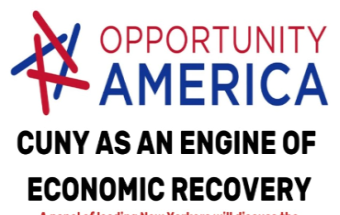[Community Colleges\”Opportunity America”]
CUNY Professor: “I find this model absolutely devastating for people of color and community colleges have no business partnering with this organization if they actually want to continue to empower students and faculty of color.”
Photo: Twitter
An Associate Professor in the CUNY system says “Opportunity America” think tank is pushing “detrimental” ideas that would be harmful to Black and Latinx students and educators.
Editor’s Note: On July 6th, we published a story entitled “Bronx Community College to Host Virtual COVID-19 Business and Education Panel.” https://www.blackstarnews.com/education/education/bronx-community-college-to-host-virtual-covid-19-business-and
A concerned New Yorker (a CUNY Associate Professor, who fears reprisals if her name is revealed) wrote to us to express her displeasure with the article. She specifically objected to Opportunity America, a think tank that co-sponsored the event at Bronx Community College. According to this professor, “Opportunity America’s” intentions will be “incredibly detrimental to both faculty and students of color” because she said, “Under the Opportunity America model, we would defund Black and Latinx Studies.”
The following essay more fully expresses this educator’s thoughts on this matter.
I recently heard about my own university system, the City University of New York, holding a talk in partnership with an organization called Opportunity America. Whenever I hear about organizations with names like this one, I think of the ill effects of organizations like Teach America, which placed inexperienced educators from the Midwest in classrooms in the Bronx, while refusing to hire diverse applicants who were from the same areas as the students. However, instead of jumping to conclusions, I clicked on the link the PSC-CUNY union posted, and was directed to the Black Star News article, titled, “Bronx Community College to Host Virtual COVID-19 Business and Education Panel.” It turns out the panel had already taken place, but I was able to look at the Opportunity America website and learn more about what it purports to know about community colleges.
What I found was disturbing.
Opportunity America (OA), which bills itself as a think tank, studied community colleges and created a report, titled, “The Indispensable Institution: Reimagining Community College.” The folks involved in creating this report clearly have experience in educational administration. However, it cannot be said that the majority of them have experience teaching actual community college students, even though the report claims some of them have “on-the-ground” experience (12). I assume they mean experience as administrators, which is very different than experience teaching students at community colleges. Furthermore, while the report claims that this supposedly well-rounded group represents the colleges it describes and hopes to transform, no one in the group is identifiable as Black or Latinx. I find this astonishing, considering that one of the biggest claims being made today is how community colleges are bastions of upward mobility for Black, Latinx, immigrant, and economically disadvantaged students.
The report itself is what one would expect from a group that has little experience teaching in the community college classroom. At one point, the OA proposes circumventing faculty and developing more courses in continuing education so that they do not have to go through the tedium of getting the courses approved by faculty, stating, “Administrators don’t have to answer to faculty governance committees or regional accreditors. When they see demand for job training, whether from students or employers, they can launch it immediately, standing up a new program in a matter of weeks or months—a process that often takes up to two years on the credit side of the college” (54). In other words, educational experts take too long in approving courses, so we should stop asking them for their expertise.
OA also states that businesses should help develop the courses, either instead of faculty or in conjunction with faculty (70-71). The group points to a supposed trend of reducing course selections in order to better guide students to what will get them a job in the fastest way possible, stating a traditional liberal arts selection of classes amounts to a “confusing cafeteria-style buffet—too many options, too much freedom of choice” (70), which makes it impossible for students to graduate with a clear job path.
Then, the group suggests that community colleges get funding based on immediate job placement based on courses offered. They state, “Our group favors an approach [to funding] geared to perceived value, as determined by policymakers” (78). One example of this is practice is described in the following fashion: “Noncredit programs that lead to high-demand, high-paying jobs are funded on a par with similar credit-bearing courses and more generously than degree offerings deemed to have little value for the regional economy or for learners’ upward mobility” (78).
Under the Opportunity America model, we would defund Black and Latinx Studies, for example, because there are no obvious jobs that we can obtain with those degrees (and I do mean obvious; there are countless jobs one can work with these degrees, but the relationship with the degree and the job is not overt to folks who would defund the humanities). Instead, we would fund courses such as “Working in Retail” because there would be a clear line to a retail job. I use the retail job as an example because it is one that is literally used in the report (48). What this amounts to is lines toward complex jobs for critical thinkers of color would not be supported, but lines to simple, low-paying jobs would be supported by this model.
Humanities courses have traditionally been taken by students of color in order to develop critical thinking skills that allow us to not only be a check and balance to unfettered power in government, but to also allow us to work in professions that support other people of color who are in unequitable situations that are a direct result of unfettered power in government. Humanities courses create teachers, therapists, social workers, community leaders, social influencers, writers, public speakers, investigative journalists, and so on. So, instead of teaching our students to understand their history and be leaders of change, we would teach them to accept the status quo and remain stuck in the same systems their ancestors fought against. I find it fascinating that a report that starts off praising community colleges for their ability to propel people of color toward upward mobility then goes on to create a model to dismantle the very thing that they claim to praise.
I find this model absolutely devastating for people of color and community colleges have no business partnering with this organization if they actually want to continue to empower students and faculty of color. Indeed, all successes point to the fact that community colleges have been doing their job (Brown, 2019; Marcus, 2018). Two college professors of color, who teach actual college students, suggest a different way of improving community colleges in their essay in “Race and Ethnicity in Higher Education.” Rios-Aguilar and Deil-Amen, understand the “pathways” trend to simplify clear paths toward a degree and/or job, but also state, “while simplification may bring benefits to some students, simplification by itself will not be sufficient to redress inequities. Marginalized community college students, particularly racial and ethnic minorities, also need faculty, staff, and administrators who care for them and understand who they are and where they come from, in order to succeed academically and in life” (“Taking History, Funding, and Current Challenges into Account When Discussing Race, Ethnicity, and Completion in Community Colleges” 130). Inherent in this statement is the need for more faculty of color and campus leaders who understand the needs of students of color.
What Rios-Aguilar and Deil-Amen are taking into consideration is faculty expertise. The Opportunity America report, on the other hand, states, “long-time faculty are out of touch with the latest trends in the workplace, and many students feel they don’t have time for the traditional academic offerings—English, math, humanities or social science courses—required to complete an associate degree” (30). How is it possible for these experienced faculty to have done such a great job, yet be so out of touch?
Humanities courses are literally the lifeline of people of color. It is the only place, if not taught by our families or churches, where we learn an inkling about our history, which is often kept out of or incorrectly revised in high school textbooks. OA would prefer to deny humanities education has value because we have yet to place a dollar amount on democracy.
My hope is that community college leaders will recognize that it is priceless and that our students deserve to understand and discuss it in their classrooms.








